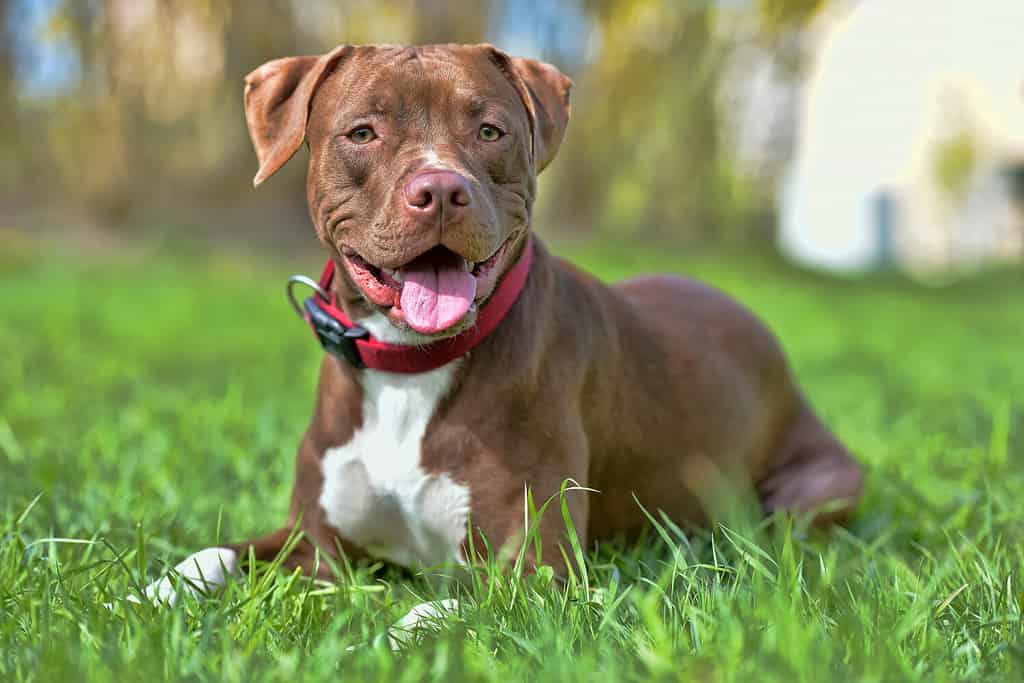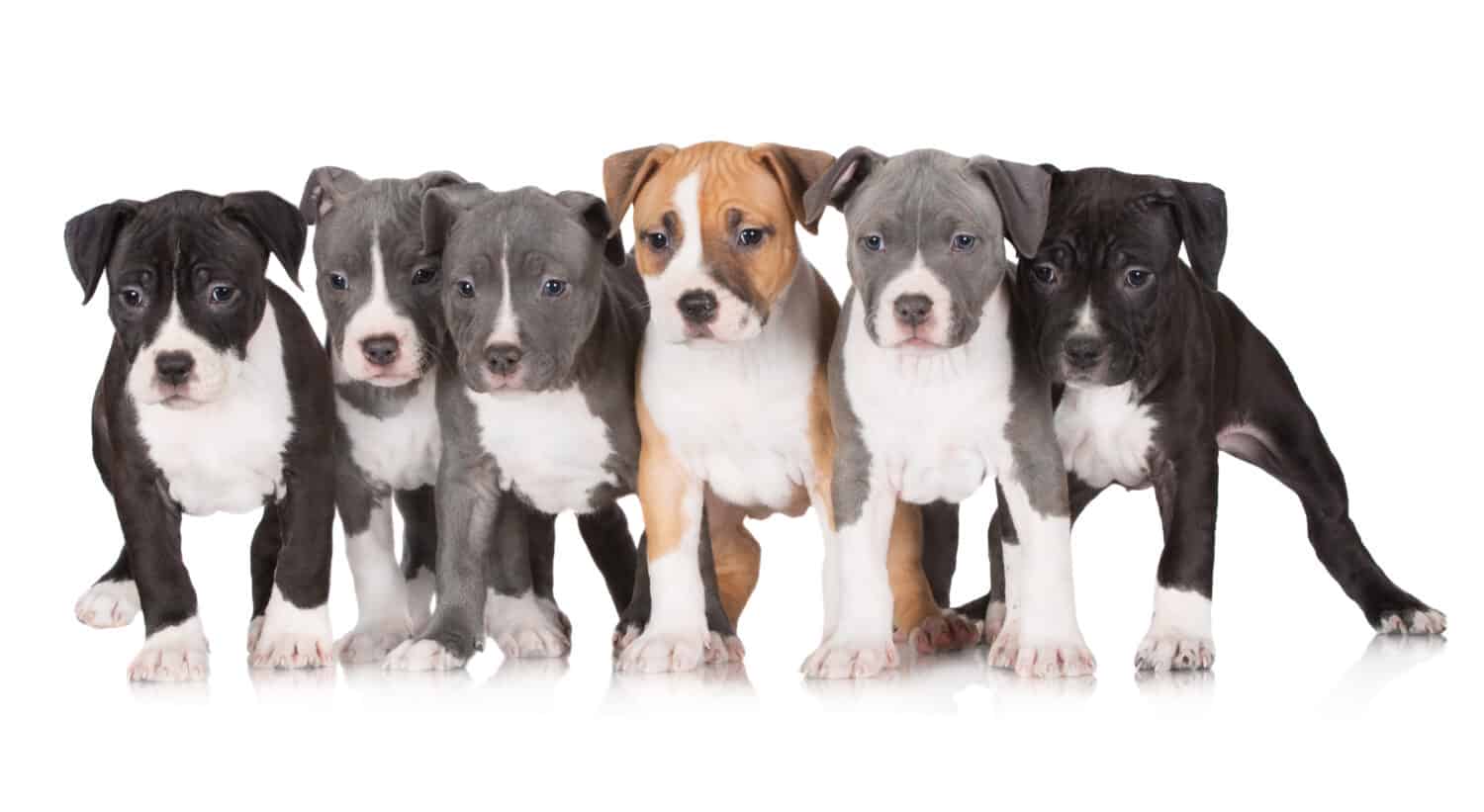The pit bull is one of the most well-known dog breeds in the United Sates. Their goofy and loving nature has made them a treasured member of many families, and they are even estimated to make up about 20% of all owned dogs throughout the U.S. With how popular the pit bull dog breed has become, it’s no wonder you want to have a pit bull puppy of your own!
We want you to be the best pit bull parent possible, so let’s break down everything you need to know about your growing pit bull friend. In this article we will discuss their breed characteristics, size, energy levels, and more!
Let’s get started.
Brief Pit Bull Introduction

Most dog lovers will agree that the pit bull breed itself is not dangerous, and the rumors that surround the breed are unfair.
©Anna Krivitskaya/Shutterstock.com
The pit bull, or the American pit bull terrier, is a treasured dog breed that has overcome harsh stigma. These loyal pups were originally bred to bait and take down bulls, but they transitioned into standard farm dog work when baiting was outlawed. Farmers soon learned just how incredible of a family dog these pups were, and they were even labeled as nanny dogs due to their gentle nature around children.
Their baiting past seemed to follow them into more recent years, and the pit bull found themselves as the poster child for illegal dog fighting. These cruel operations used the pit bull’s powerful stature and loyalty against them. Thankfully, animal welfare organizations around the world are putting a stop to these practices, and fighting the stigma that pit bulls now face as a result.
Most dog lovers will agree that the pit bull breed itself is not dangerous, and the rumors that surround the breed are unfair. The pit bull is an incredible companion to have at your side, and they will flourish when raised in a loving home.
Pit Bull Puppy Growth Progression
If you are planning to adopt a pit bull puppy, then you will need to better understand their growth from puppyhood to adulthood. Let’s offer you some size averages in male and female pit bull puppies.
| Pit Bull Age | Male Pit Bull Weight | Female Pit Bull Weight |
| Birth | About 1 pound | About 1 pound |
| 1 Month | 3-5 pounds | 2-4 pounds |
| 6 Weeks | 5-10 pounds | 4-10 pounds |
| 2 Months | 5-15 pounds | 5-15 pounds |
| 3 Months | 10-20 pounds | 10-20 pounds |
| 4 Months | 15-25 pounds | 12-20 pounds |
| 5 Months | 15-30 pounds | 15-25 pounds |
| 6 Months | 20-35 pounds | 15-30 pounds |
| 7 Months | 20-40 pounds | 15-35 pounds |
| 8 Months | 25-45 pounds | 20-35 pounds |
| 9 Months | 25-50 pounds | 20-40 pounds |
| 10 Months | 30-55 pounds | 25-40 pounds |
| 11 Months | 30-55 pounds | 25-45 pounds |
| 12 Months | 30-55 pounds | 25-45 pounds |
| 2 Years | 30-60 pounds | 25-50 pounds |
Most pit bulls are considered medium sized dogs, so they should reach their mature size by the time they are 12 months old.
Pit Bull Puppy Appearance: Breed Characteristics

Pit bulls have a thick frame from the time they are tiny puppies.
©otsphoto/Shutterstock.com
Your pit bull puppy will grow into a strong and sturdy companion, so you will see evidence of their athletic frame from puppyhood. They will likely have a thick frame from the time they are tiny puppies, and this will stand true as they age. Their muscularly build should be obvious by the time they are 6 months old, and they will continue to fill out until they reach 16 months of age.
Your pit bull will likely have a wedge-shaped head that will broaden as the months go by. They have small to medium-sized ears that will often droop over the side of their cheeks, but their ears should firm up slightly as they mature.
Pit bulls have a short and fine coat that can come in a variety of colors. Some of the most common pittie coat colors include black, brown, white, fawn, and grey. However, there are a few rare pit bull coat colors as well. Their eyes are deeply set in their face, and their eye color can vary from brown to beautiful shades of copper.
Pit Bull Puppy Energy Levels: Exercise Requirements

Pit bull puppies need plenty of daily exercise to expel their high energy levels.
©cynoclub/Shutterstock.com
Pit bulls are considered a highly active breed. Their high energy levels are present from puppyhood, so you will need to offer them plenty of daily exercise from the moment you adopt them. While we do not recommend any vigorous exercise until your pittie is at least one year old, there are plenty of safe ways to help your pit bull puppy blow off some steam. Some of the best exercises for pit bull puppies include going on 15-20 minute walks, playing a game of fetch, accompanying you on a short hike, and even swimming.
Just remember that if you plan to take your pit bull puppy to any public settings to burn off some energy, make sure they are fully vaccinated. Infectious diseases can be found in environments ranging from public parks to pet stores, so you want to make sure your pit bull is fully protected. Your pit bull puppy should have a three vaccine series to protect them against parvovirus and distemper, as well as vaccinations against rabies.
Pit Bull Puppy Training Tips
Pit bulls are a highly intelligent, so they typically catch on quickly to obedience training. They can struggle with stubbornness throughout the training process, but as long as your training methods are engaging and positive, they should do just fine. Pit bulls respond best to positive reinforcement style training, so be sure to offer plenty of praise and traits each step of the way.
In addition to implementing positive reinforcement training, you should also dive into the socialization process from the moment your pit bull enters your home. Pit bulls can struggle with fear or aggression around unknown people and animals, so it’s important to make sure they are confident in these scenarios. We suggest introducing your pit bull puppy to new people in and outside of your home, encouraging safe playtime with other animals, taking them to new environments, and even introducing them to new sounds.
Pit Bull Puppy Veterinary Care
One of the best ways to ensure a long and healthy life for your pit bull puppy is by establishing a veterinary care routine from the moment you adopt them. Let’s break down some of the veterinary care they will need throughout the first year of their life!
Puppy exam: We always recommend scheduling a puppy exam with your vet when you adopt your pit bull. No matter what care they have received before you adopted them, it is always best to establish a relationship with the vet they will be seeing from now on. Your vet can make sure that they are not only healthy, but that they are up to date on any preventative care.
Vaccines: Your pit bull puppy will need a series of puppy vaccines to protect them against infectious illness. These puppy vaccines will protect them against illnesses like parvovirus, distemper, adenovirus, rabies, and more.
Deworming: All pit bulls puppies should be dewormed the moment you adopt them. Mothers can transmit intestinal parasites to their pit bull puppies during the nursing process, and your little one can also be infected through contaminated soil. Deworming your pit bull puppy the moment you adopt them will ensure safety for everyone in the home.
Heartworm prevention: Your pit bull puppy can start taking monthly heartworm prevention when they are 8 weeks and older. Heartworm disease is spread to dogs through an infected mosquito bite, and it can lead to fatal heart disease for the pup affected. Monthly heartworm prevention will keep your little one safe from this dangerous condition.
Final Thoughts On The Pit Bull Puppy
A pit bull puppy can be a wonderful addition to any dog-loving home! Be sure to review the information we discussed above, and you can be best prepared for raising your adorable pup!
The photo featured at the top of this post is © dezy/Shutterstock.com
Ready to discover the top 10 cutest dog breeds in the entire world?
How about the fastest dogs, the largest dogs and those that are -- quite frankly -- just the kindest dogs on the planet? Each day, AZ Animals sends out lists just like this to our thousands of email subscribers. And the best part? It's FREE. Join today by entering your email below.
Thank you for reading! Have some feedback for us? Contact the AZ Animals editorial team.







